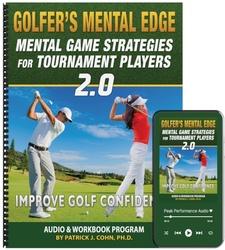Stop Over Analyzing and Trust Your Swing

Do you work on your swing mechanics when playing tournament rounds or rounds for score?
Working on your swing or thinking too much about technique while playing is not be the best way to score your best.
Over-thinking technique and over-analyzing your swing increases muscle tension, decreases trust, and leads to what is called “paralysis by over analysis.”
In some cases, paralysis causes golfers to freeze, creating a hitch in their stroke, or leads to the yips in extreme cases.
When you judge your swing, you are in a state of over control or force the swing through its path. Lack of trust is the main reason why some golfers choke under pressure.
You will perform more efficiently and effectively if you rely on muscle memory (motor memory) or trust what you have trained your body to do.
I’m sure this thought has probably popped up in your mind, “What if I am working on something in practice? It’s not fully learned yet. Shouldn’t I focus on that while I’m playing in a tournament?”
What does Rory McIlroy say about this as he is in the midst of trying to work though a slump by working on his technique?
Placing Trust in Your Skills
McIlroy was world number one in the Official World Golf Ranking for 95 weeks and is a four-time major champion. McIlroy dropped out of the top ranking last year and is the only member of the world’s top five not to win a tournament in 2016.
It has been a full year since McIlroy last won on tour, so McIlroy has been working on his swing in hopes of regaining his form.
McIlroy: “I’d got into a couple of bad habits leading up to the Masters and it’s never really a good time to work on them – you are just trying to play golf and shoot a score.”
McIlroy took a three week hiatus and has decided to take breaks from playing tournaments throughout the season. In fact, McIlroy opted out of the 2016 BMW PGA Championship to work the kinks out of his swing.
McIlroy has spent long hours working on his swing, which he believes has lead to inconsistent results.
Unfortunately, thinking too much about his swing and playing good golf are constantly in opposition.
This is the dilemma all golfers face: How to improve technique without over-analyzing or judging your swing during tournaments.
The trick is to work technique in practice rounds but let go of focusing on technique in tournaments.
As you well know, it takes time for those swing changes to take hold. But when are golfer ever done working on their swings?
Motor learning experts would say that it takes 30-60 reps for 30-60 days to learn a new movement, so you have to be patient with changes.
The key is to separate training from playing golf. You want to train your swing in practice, but trust your swing and “win ugly” on the course. Use what you have that day to score your best!
Tip for getting out of ‘thinking mode’ during tournaments:
Remember, judging and analyzing your swing is for practice, but hitting to targets is for tournament time. A calm mind is preferred for playing.
On the course, you want to focus on mental preparation for each shot, not a checklist you have in mind about a good swing.
I suggest that you only focus on one swing trigger when playing. This strategy will turn off your analytical mind and help you simplifying your swing on the course.
Check out The Golfer’s Mental Edge for more strategies to simplify your swing and to determine your ideal type of swing thought…
Golfer’s Mental Edge

What’s the big sign that your mental game is the weak link in your golf game? When you can’t play consistently as well as when you play a practice or casual round–or your range game is way better than your game on the course. If you suffer from lack of focus, low self-confidence, poor composure or other mental game obstacles on the course, you can’t reach your true potential in golf.
The Golfer’s Mental Edge 2.0 Audio and Workbook program is ideal for any amateur, collegiate, junior, and tour professional golfer.
Golf coaches and instructors would also be wise to teach “The Golfer’s Mental Edge 2.0” principles to their players. This program is perfect for any golfer who wants to improve performance and consistency by managing their mind better on the course.

